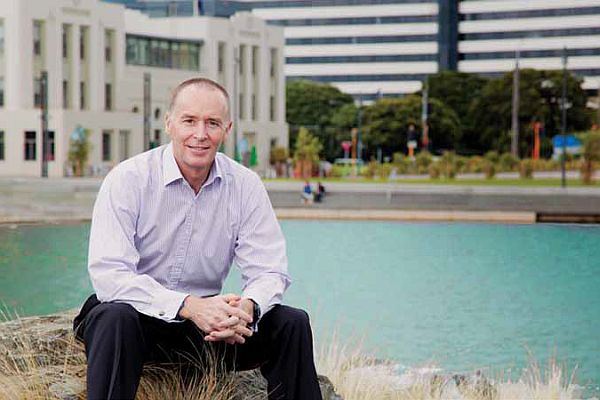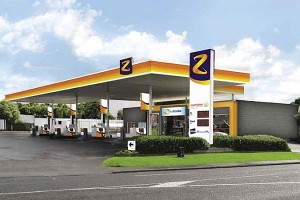Published on the 07/11/2011 | Written by Jonathan Cotton

Transitioning Shell from global outpost to fresh local upstart has presented some major marketing conundrums, and some tough technology challenges along the way…
“Once upon a time,” says Mike Bennetts, chief executive of Z Energy, “service stations were a place to go. Twenty years ago it was all about being a destination…but now we’re an interruption to a busy day”. The humble service station is no longer a place to pick up the paper, get repairs or shoot the breeze on mechanical advice. Rather, at its most fundamental, it’s simply a site of the ultimate grudge purchase: yet another tank of gas. Despite rising prices, margins on fuel remain slim at around 2-3c per litre, and petrol companies are learning that survival these days is as much about pies and coffee as it is about petrol. It’s a tough environment. An environment that is not without its risks. The playing field That’s why Royal Dutch Shell, the global conglomerate, decided it wanted out of the kiwi retail and distribution market – concluding it was too tough, and not profitable enough to fund the sizable investment required to upgrade. Enter infrastructure investment firm Infratil, and The Guardians of New Zealand Superannuation who bought the Shell assets for NZ$695 million on April 1, 2010 to create Greenstone Energy. After a busy year, Greenstone have re-emerged from under the wing of the Shell monolith to create the Z Energy brand as the new face of 219 petrol stations and 94 truck stops around the country Z as in New Zealand, but with, like, a Zed… If you haven’t seen the logo yet, you soon will. Rebranded stations are being rolled out across the country as we speak. And once you have seen that new logo – an orange and yellow-hued letter ‘Z’, fashioned to resemble a figure-eight infinity symbol against an ‘azure blue’ backdrop – you’re bound to have an opinion on it. “Reaction”, says Bennetts, “has been mixed”. “Some people love it, some like it, some don’t understand it and some hate it. And that’s fantastic. I think if everyone loved it we’d probably have played too conservatively; if everyone hated it, we’d clearly have got it wrong.” In an informal piece of online research conducted by iStart, the ‘hate its’ are outnumbering the ‘love its’ by about 10:1 – perhaps that’s to be expected when something as iconic as the Shell logo is being supplanted. But a shiny new logo is just the tip of the iceberg of what Bennetts and Z Energy has undertaken in Shell New Zealand’s metamorphosis into Z Energy. Having spent almost two decades working overseas, as Commercial Director at BP Southern Africa Pty Ltd, Chief of Staff at BP Oil International and CEO and Director at BP Integrated Supply and Trading Eastern Hemisphere, Bennetts had decided, long before the CEO position at Z was proposed, that returning to New Zealand was where he wanted to be. “I’d spent 17 years outside of New Zealand and my eldest daughter was just about to start high school,” he says. “They’d never lived here, so we said ‘actually, we should give them the experience of living in New Zealand – if it works then great, if it doesn’t we’ll hike off again”. So Bennetts and family arrived back in New Zealand, taking a year off “to shake off things and reconnect with New Zealand” and Bennetts swearing off oil and gas as “the last place” he wanted to be. It was not to be however. While involved in some consulting work in Sydney, Bennetts received some phones calls – two within twenty minutes – urging him to take a look at the newly available CEO position at Greenstone. “I said to both of them ‘no thanks, I don’t want to do oil and gas and Shell is a number three player’, because that’s the way I remember it – seventeen years ago.” More phone calls urging him to consider the position sparked his imagination however, and a four hour meeting with Infratil CEO Marko Bogoievski and executive director and the Chief Investment Officer of Morrison & Co (parent of Infratil), Lib Petagna, “that was as much about them picking my brains on how to close out the [purchase of Shell] deal”, got him thinking more seriously about the opportunity. The phone rang the next day and Bennetts was offered the job. Building a business What followed was the transformation of the Shell NZ business, from a satellite of Shell international to a company that would run, and be recognised as, an independent Kiwi-owned and operated business. That meant bringing a raft international processes home to New Zealand.
“ Some people love it, some like it, some don’t understand it and some hate it. And that’s fantastic. I think if everyone loved it we’d probably have played too conservatively; if everyone hated it, we’d clearly have got it wrong. ”
That meant the creation of an in-country finance team, business plan, treasury and hedging policies, procurement and contracting policies and processes, local tax arrangements and funding. It also meant the creation of brand new HR policies and processes, as well as business continuity, health and safety, disaster recovery and crisis management processes. The new company would need new policies across all aspects of IT from security to information man-agement, and new supply agreements for crude and product supply and new coastal shipping arrangements. “We had to stand up a company on its own two feet in New Zealand,” says Bennetts, “when it had very much previously been wired in, both physically and metaphorically, to a series of other companies elsewhere in the world”. “If you sit in London, and you’ve got a hundred thousand employees, spread across one hundred countries, you actually want to run that by being centralised, regionalised and in some cases, globalised, because that’s the way you look at efficiency and effectiveness. But when you sit in New Zealand, you say ‘the best way to run the New Zealand business is as one company’. “It was under the banner of Shell but it was nine little offices,” says Bennetts. “The retail guy reported to Melbourne, the marine guy reported to Singapore, the IT people reported to Singapore, so you had to plug all of that in locally – that’s what the transition was.” The team began by determining four organisational priorities to set up as project teams. The first was ‘momentum’, concerned with retaining market leadership, satisfying customers, keeping safe and beating the competition – in other words the ‘business as usual’ team. The second, ‘transition’, was the team responsible for the process of unplugging from Shell globally and plugging in that functionality locally. ‘Strategy’ was the task of creating a new future for the current core business; and the fourth priority team was ‘organisational development’, responsible for a strategy for the company that dealt with people inside the firm – the vision, values and culture of the business. Those four priorities were decided upon early, and then staffed accordingly. …
The big four representing Shell, BP, Caltex and Mobil control 90 per cent of the retail fuel market in New Zealand. Gull, GAS, a few other minor players and the sole locally-owned brand Challenge scrap over the last 10 percent. There’s no shortage of choice for motorists. Throw in the odd environmental disaster, and rocketing world prices and casualties emerge.

































